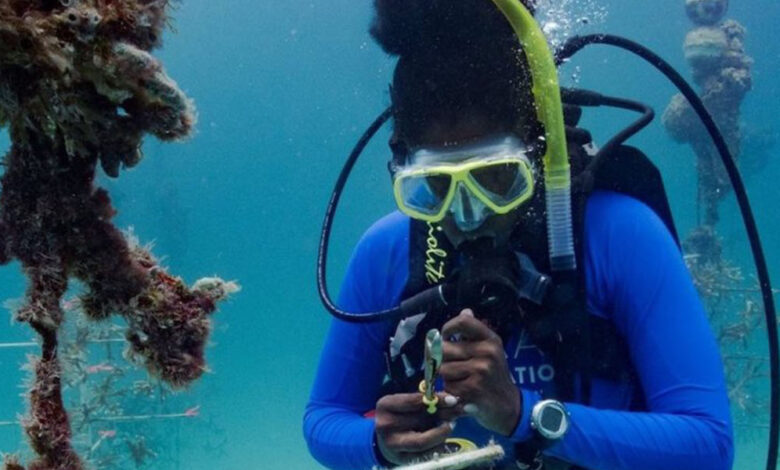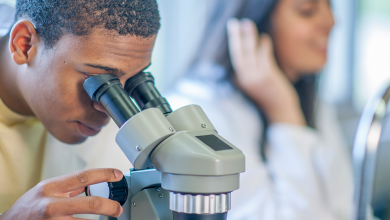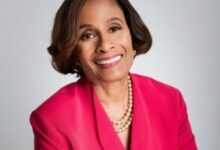
Black Professional Scuba Divers Talk Up Ocean Careers
Little Understood STEM Profession Opens Doors to Exciting Work
Scuba diving is an exciting STEM-related career, but many Blacks may think of it as a recreational activity.
Educating people about scuba diving careers is a top objective of the National Association of Black Scuba Divers (NABS). With a national membership of 1,000, NABS spreads the word about dive projects, ocean research, changes in the ocean environment, search for historical artifacts and operating scuba equipment.
Andrea Williams, a certified diver and instructor, has been a member of NABS since 2009 and is now its national vice president. The D.C. resident has worked on dives worldwide, exploring coral reefs, finding artifacts from a Tuskegee Airmen plane wreckage and discovering remnants from sunken ships.
In regard to STEM-related majors in college, Williams knows that studying the ocean seldom comes up when Black families review potential majors with their children. Large technology universities may assume a Black student is not interested in oceanography, a notion rooted in negative perceptions about Blacks and swimming. Further, not many historically Black colleges and universities offer marine biology, one of the primary majors for scuba diving careers.
Within the federal government, scuba divers work at the National Oceanic and Atmospheric Administration (NOAA) within the Department of Commerce, the National Park Service or the Environmental Protection Agency. The Nature Conservancy, Ocean Conservancy, and Coral Restoration Foundation are scuba diver work settings in the private sector.
The range of jobs includes marine life and ecosystems, ocean preservation, and seafloor geology. There are also jobs on dives searching for remnants of sunken vessels.
Opening Young Minds to the Oceans
Williams works part-time at Blue Planet Scuba, a training facility and dive shop in Adams Morgan. Kim Walker, a certified diver and training instructor who also works at the dive shop, is president of Underwater Adventure Seekers (UAS), a 100-member D.C.-based dive club under NABS. A native Washingtonian, Walker is a retired Air lieutenant colonel and retired from the D.C. Department of Transportation.
Like Williams, Walker is a strong advocate for getting children into diving early. Through their regional and local affiliates, NABS conducts programs that give children an appreciation for scuba diving while stimulating curiosity about underwater careers.
“I tell kids there’s a lot of opportunities related to scuba diving,” said Walker, a Hyattsville resident. “You look at this planet, and it’s seven-tenths water. There is a demand for marine science, marine biology, oceanography and environmental protection in the marine environment.”
Williams and Walker bring videos showing Black divers prepping for dives and exploring oceans, enabling children to imagine the world of scuba diving.
“We bring our scuba gear. That’s a part of our show-and-tell. Kids visualize what they will wear in the water,” Walker said. “Once they see that, they connect the dots and think this might be something they would be interested in doing.”
“Groups like the Black Girls Dive Foundation and Junior Scientists in the Sea are other outlets to connect with kids in the K-12 age range,” Williams said.
At D.C.-area pools, “Fun Dive Days” is another way to get youths interested in scuba diving. Children get in a pool with certified Black scuba divers, getting hands-on experience with the equipment.
But despite having face-to-face interaction with children and orienting them with scuba training and careers, a bigger challenge with getting them into scuba diving is the cost.
“Diving is not cheap. Therefore you need parents in the room to ensure they understand what it is all about,” Walker said.
Diversity in the Industry
Williams knows her scuba diving path had a unique foundation. Her stepfather is a certified scuba diver, as are her brother and sister, and her mother is certified in snorkeling. After graduating from Spelman College with a major in French and a minor in biology, Williams went to graduate school at Ohio University in Athens, Ohio, where she took a dive course.
In their leadership roles with NABS and UAS, Williams and Walker have their eyes on diversity in scuba diving. National scuba diving organizations and scuba equipment manufacturers should be in those conversations. Grants, scholarships and sponsorships are a part of the equation to diversify their profession.
Williams has a vision for what needs to take place.
“The dive industry, higher education, then K-12 need to be on board. Then action will trickle down,” she said. “We’ve been working from the bottom up. We want to speak with those individuals who have the power and the money.”
Learn more about Black scuba divers at https://nabsdivers.org. Find out about the Black scuba divers group in Washington, D.C., at https://uasdivers.org.
The post Black Professional Scuba Divers Talk Up Ocean Careers appeared first on The Washington Informer.










